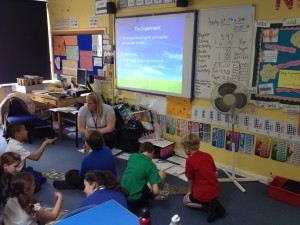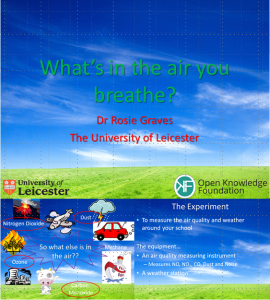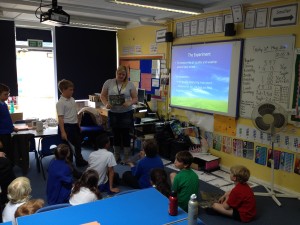Recruiting Scientists
Rosie Graves - June 10, 2014 in Panton Fellowships, Panton Principles
Anyone whose been following the progress of my fellowship through my blog posts will know that I have been working towards getting sensors into schools for a while now. Well a couple of weeks ago I finally ran an introductory session with some primary school pupils (aged 8-11) at Kibworth CE Primary school in Leicestershire.
I had been developing the introductory material for a few weeks prior to the lesson with some help from the teachers at Kibworth who have been really responsive and open to my ideas. We decided we wanted this activity to be very student led so that they actually planned much of the experiment themselves to encourage them to think about why we were doing this in more depth. We titled the introductory session “What’s in the air you breathe?”.
I started the session by introducing the topic of air quality to the students, from the very basic first discussions of what makes up the air to talking about emission sources and health effects of air pollution. The introduction lasted less than 20 minutes and I encouraged lots of discussion with the students, asking them specific questions to work out what knowledge they had and to allow them to teach one another. The response to this was great and I was impressed by how much they knew about the atmosphere, one student explained the greenhouse effect to us and another mentioned the ozone hole. I hadn’t expected them to know so much about the topics we were discussing and so I was really pleased when I started talking to them.We then showed the students the equipment that they would have in school and explained what everything did. It was then over to the students to work out in groups where they wanted to install all of the sensors. To make this decision I asked them to think about where they thought the sources of air pollution around the school would be and where there are people who would be breathing it in. They quickly identified that the highest levels of pollution were likely to be in the car park, near the road and at the bottom of the playground which was relatively close to a train line. They also told me that in the morning and afternnon lots of people would be walking through the car park and at lunchtimes the students would all be in the playground. At this point one of the fundamental hurdles of being a field work scientist had to also be explained to the students- some of the sensors need mains power and so although the school gates may have been a good position in terms of producing interesting data, logistically it wasn’t possible to power the sensor that far from the school building.After lots of enthusiastic discussion and some expectation management they decided that they would like to put the sensor in three positions and so the pupils planned to move it around the school during the term. These were:
- In the playground near to the car park and the chicken coop- they wanted to see what levels of pollution the chickens were being exposed to as well as themselves during playtime.
- At the bottom of the playground near to the train tracks.
- In the main playground where most of the students played at lunchtimes.
The sensors are now with the school waiting to be installed in the next few weeks at which point data will start streaming in. While the students are busy being the scientists I need to get on with planning a data analysis session that we can run before the summer holidays. Overall I’m really pleased with how the session went and look forward to going back into the school soon.






 o! My name is Samuel Moore and I am delighted to have been selected for a Panton Fellowship this year. I wanted to write a quick post to introduce myself, my background and my plans for the fellowship.
o! My name is Samuel Moore and I am delighted to have been selected for a Panton Fellowship this year. I wanted to write a quick post to introduce myself, my background and my plans for the fellowship.